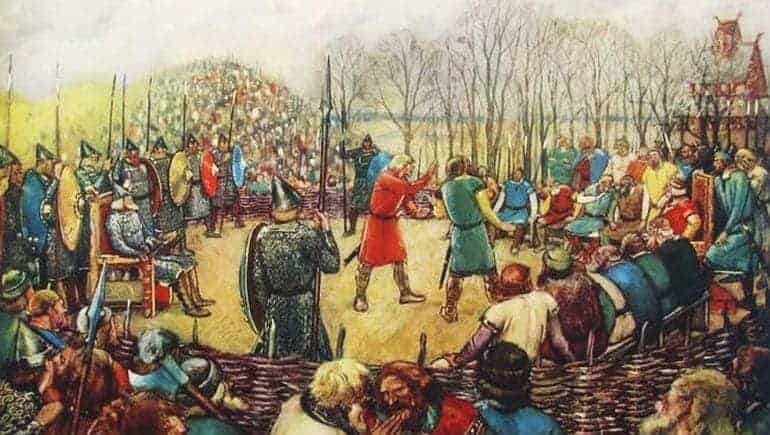The Vikings are known as plunderers, murderers and generally perceived as violent thugs by those with only passing knowledge of these Norse warriors. In reality, most of the Vikings were hunters and fishermen who embarked on their adventures to help them survive the harsh winters back home. As they had an oral culture with rune writing, it isn’t easy to find accurate details of Viking society but what we do know is that they were not lawless savages.
Even with the lack of written law, there was a system of government amongst the Vikings. Their free men would gather within their communities to create new laws and decide cases and punishments if applicable. These meetings were called a ‘Thing,’ and each Viking community had its own Thing.

It was necessary to have these meetings or else chaos would reign and disputes would be settled via duels or bloody family feuds. The purpose of the Thing was to solve these disputes in a legal manner. The Thing would meet regularly at pre-determined times, and there was a law speaker at each meeting who had the ability to recite the law from memory.
With the aid of the local chieftain, the legal speaker would judge and settle each case they heard, and every free man within the community was allowed to speak at the Thing; which means Vikings were allowed their day in court just like in the modern era. And just like it is today, these meetings were dominated by the wealthiest and most powerful individuals.
The Oldest Parliament in the World
It is incorrect to suggest that no Viking laws were ever written down. In fact, written records were kept when the Norse converted to Christianity. Before this practice, the Vikings would somehow remember their laws and pass them on to the next generation. There were typically two Things a year; one in spring and another in autumn. Each region would have its own Thing, and it would last for a full week.

Iceland has the distinction of having the world’s oldest parliament; the Althing. It was established by the Vikings in 930 at Thingvellir which is less than 30 miles from the nation’s capital, Reykjavik. There was a law rock, known as the logberg, in the middle of the assembly. The speaker of the assembly sat there, and it was his duty to say the decisions and laws out loud to the attendees. The logretta was the Althing’s most important group; it was made up of the nation’s 36 district leaders, nine members, and the speaker.
The Althing remained at Thingvellir until it moved to Reykjavik in 1845. However, the modern-day Republic of Iceland was established at an Althing session at Thingvellir in 1945.
While the Althing sessions were similar to the Roman Senate, it differed in that everyone had a voice, unlike the Roman version where senators were the only ones allowed to speak. The Thing was able to decide who should be the king; it also set taxes, negotiated property ownership and oversaw marital disputes. Also, murders and other serious crimes were investigated and judged at the Thing.
The Vikings allowed someone who was accused of murder to call on the support of 12 men who claimed the accused was innocent; it is similar to a modern-day Jury except these individuals were biased towards the defendant. If the freemen that assembled at the Thing found the defendant guilty of the crime, he would be forced to pay a fine, known as a Weregild, to the family of the victim. The Weregild was a system of value placed on all property and humans. It is similar to a modern-day civil suit.
In some cases, a convicted murderer was sentenced to death or banished from the community for a set period of time. Another option was for the family of the victim to demand the case be settled via a duel, known as a Holmgang. While the Thing was dominated by the wealthy and powerful families of a community, it was effective in settling disputes and giving a voice to all freemen. In that sense, it was an improvement on the Roman model.

